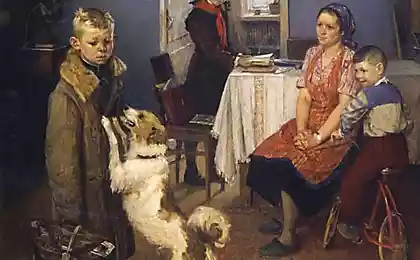445
Are You ready to call your parents on You. And Your children?
How to refer parents to You or on you? This question is raised by many satisfied real verbal battle in favor of his option. We will try to find a middle ground.

Mom, You tired me...
For
On the forums supporters of this form of treatment believe that in this way they emphasize respect for parents, acknowledge their experience and wisdom. And "poking" supposedly brings parents into the category of age-mates. In the example given the experience of the 19th century, when parents were treated to the "YOU" that created some distance, but not alienate.
Opponents also believe that "vikane" in any case too formal and makes loved ones "strangers". What kind of open communication can we talk?
Dad, you're wrong...
For
Communication YOU're talking about dialogue on an equal footing, which makes the relationship with parents to a new level of mutual respect. Form YOU are quite justified in dealing with grandmothers, grandfathers, uncles-aunts, but referring to parents this form deprives of warmth and trust, believe the adherents of this style of communication.
Against
Communication allows YOU to minimize the surge of negative emotions disrespectful to the fathers – agree, hysteria, turning to the man on YOU much harder than to send a "long voyage" to YOU.
Expert commentary
Controversial forms of treatment of says psychologist Elena Lubchenco.
"YOU are for many of us bears only a formal character, and YOU're honest friendly tone. Out of context, local traditions and habits, social background of speakers, it is impossible to judge how to say polite. And etiquette here at all at anything nowadays. It seems that YOU expresses respect for the person. To the parent and strangers made contact to YOU. But why, then, friends, saying YOU, too, expresses respect? Really, respect strangers more than the respect of friends and relatives? Isn't it strange that to God we appeal to YOU, but to every small boss on YOU? Paradox! Maybe it's not lack of respect? Then what?
Appeal to you or YOU depends greatly in all ages from fashion. Rooted this tradition, that of respect we need to tell YOU. But the real true respect does not depend on spoken YOU, but from the linguistic traditions of each locality. Brought at the time appeal to YOU from Poland and France (at different times and in different countries) is now virtually nonexistent in many foreign languages. Although there are countries where there is no appeal to YOU.
Under Peter I vykane expressed social status, position in the social structure, and lack of respect for the man. That's the secret of the pronoun. Much later the human mind has adapted this understanding: YOU-the situation is transformed in respect. And gradually the situation, and the respect began to emphasize through YOU.
And here is included the same human psychology. It is the natural desire to feel the respect of others, to hear to his respectful treatment prompted the person to take the position at least through the appeal YOU. A sort of illusion position=respect in the "vertical race". Society has developed a certain etiquette. Good or bad, does not matter at all. Too much of it is rooted. And appeal to YOU emphasizes the detached respect for the man. It is as if protects us from rudeness, but from direct contact. Holds the the boundaries. But the appeal to YOU on the contrary brings, calls, domashniaia communication. And even is in some way an intimate. Though admits the interlocutor in the comfort zone. Among psychologists as a matter of understand the appeal to each other for YOU and in communicating with the client. It is believed to be a more reliable form of treatment than YOU."
Source: hochu.ua
Source: /users/4

Mom, You tired me...
For
On the forums supporters of this form of treatment believe that in this way they emphasize respect for parents, acknowledge their experience and wisdom. And "poking" supposedly brings parents into the category of age-mates. In the example given the experience of the 19th century, when parents were treated to the "YOU" that created some distance, but not alienate.
Opponents also believe that "vikane" in any case too formal and makes loved ones "strangers". What kind of open communication can we talk?
Dad, you're wrong...
For
Communication YOU're talking about dialogue on an equal footing, which makes the relationship with parents to a new level of mutual respect. Form YOU are quite justified in dealing with grandmothers, grandfathers, uncles-aunts, but referring to parents this form deprives of warmth and trust, believe the adherents of this style of communication.
Against
Communication allows YOU to minimize the surge of negative emotions disrespectful to the fathers – agree, hysteria, turning to the man on YOU much harder than to send a "long voyage" to YOU.
Expert commentary
Controversial forms of treatment of says psychologist Elena Lubchenco.
"YOU are for many of us bears only a formal character, and YOU're honest friendly tone. Out of context, local traditions and habits, social background of speakers, it is impossible to judge how to say polite. And etiquette here at all at anything nowadays. It seems that YOU expresses respect for the person. To the parent and strangers made contact to YOU. But why, then, friends, saying YOU, too, expresses respect? Really, respect strangers more than the respect of friends and relatives? Isn't it strange that to God we appeal to YOU, but to every small boss on YOU? Paradox! Maybe it's not lack of respect? Then what?
Appeal to you or YOU depends greatly in all ages from fashion. Rooted this tradition, that of respect we need to tell YOU. But the real true respect does not depend on spoken YOU, but from the linguistic traditions of each locality. Brought at the time appeal to YOU from Poland and France (at different times and in different countries) is now virtually nonexistent in many foreign languages. Although there are countries where there is no appeal to YOU.
Under Peter I vykane expressed social status, position in the social structure, and lack of respect for the man. That's the secret of the pronoun. Much later the human mind has adapted this understanding: YOU-the situation is transformed in respect. And gradually the situation, and the respect began to emphasize through YOU.
And here is included the same human psychology. It is the natural desire to feel the respect of others, to hear to his respectful treatment prompted the person to take the position at least through the appeal YOU. A sort of illusion position=respect in the "vertical race". Society has developed a certain etiquette. Good or bad, does not matter at all. Too much of it is rooted. And appeal to YOU emphasizes the detached respect for the man. It is as if protects us from rudeness, but from direct contact. Holds the the boundaries. But the appeal to YOU on the contrary brings, calls, domashniaia communication. And even is in some way an intimate. Though admits the interlocutor in the comfort zone. Among psychologists as a matter of understand the appeal to each other for YOU and in communicating with the client. It is believed to be a more reliable form of treatment than YOU."
Source: hochu.ua
Source: /users/4
Professor Carl dzherassi — People will stop having sex for procreation
A bus the size of a small house
























